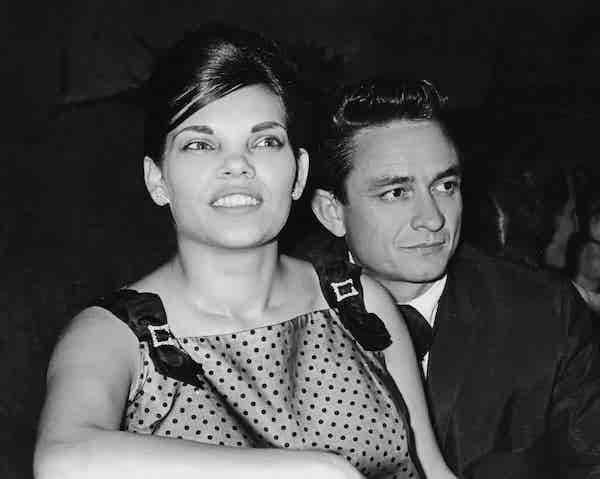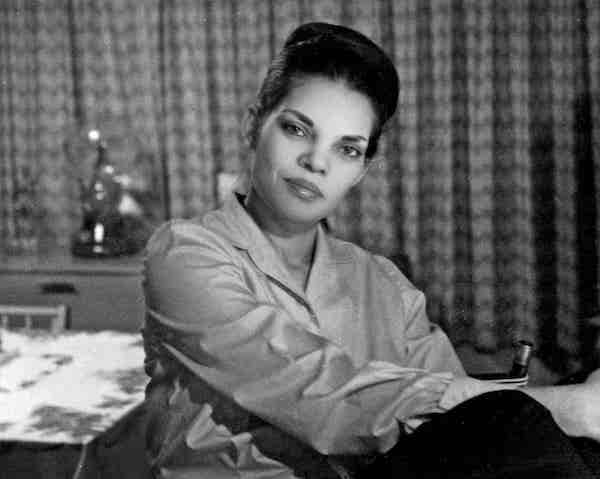Johnny Cash burned through personalities on his journey to cultural icon. Tenant farmer, Air Force cadet, rockabilly pioneer, country superstar, actor, drug addict, homewrecker, uber-patriot, teetotaler, elder spokesman, The Man in Black played out his messy, contradictory life largely in the public eye.

From the icy determination of “I Walk the Line”and “Ring of Fire” to the bleak nihilism of “Hurt” and “Rusty Cage,” his songs helped define his times. Cash connected with the public as few artists could, even as he shrugged off the personas that formed them.
A version of his life was told in the movie Walk the Line, directed by James Mangold and starring Joaquin Phoenix as Cash. In it the musician, floundering from the demands of celebrity, is rescued from his demons by a kind, understanding June Carter (played by Reese Witherspoon). Cash’s first wife Vivian Liberto (Ginnifer Goodwin) is treated more harshly. Shrill, disapproving, she exists as an obstacle to Cash’s happiness.
“I haven’t seen the movie and I don’t want to see the movie,” Cash’s daughter Cindy says near the beginning of My Darling Vivian, a documentary about her mother. Her lingering resentment is one of the engines behind director Matt Riddlehoover’s movie. Here is a chance to set the record straight about a woman who has been erased from most accounts of Cash’s life.
In separate interviews, her four daughters—Rosanne Cash, Kathy Cash Tittle, Cindy Cash, and Tara Cash Schwoebel—recount Vivian’s deep, lasting love for their father. Born in San Antonio in 1934, she led a sheltered life, raised by strict parents and attending a Roman Catholic girls’ school. She was 17 when she met Cash, then an Air Force cadet, at a roller skating rink. Prohibited from marrying, they corresponded through hundreds of letters while he was stationed in Europe.
Riddlehoover assembles photographs, home movies, acetates, and archival interviews to offer glimpses into a pivotal moment in American culture, told by the very people who were changing it. Cash’s first singles from Sun Records won over an unexpectedly wide audience. The hits continued when he moved to Columbia Records, where he released concerts recorded at San Quentin and Folsom prisons.
An imposing figure on radio and TV, Cash felt comfortable on the stages of both the Grand Ole Opry and the Newport Folk Festival, with Roy Acuff and Bob Dylan. The rest of the country wasn’t so flexible. It’s startling to be reminded how regimented and unyielding society was in the early Sixties, when the mere rumor that Vivian was black might derail Cash’s career—let alone his arrest for smuggling amphetamines across the Mexican border.
Cash seemed to court trouble, upsetting gatekeepers on purpose. His album of Native American protest songs, his duets with Dylan, his appeals for tolerance (set forth in songs like “Man in Black”) predicted the coming cultural revolution. And like that revolution, he left a lot to deal with in his wake.
Because Vivian kept out of the public eye, the observations and reminiscences of her four daughters here are key. Rosanne, a Grammy-winning musician, was born a month before Cash’s first single was released. Her sister Cathy arrived “10 months and 23 days” after. Cindy was born just as the family was moving to Encino, California, so Cash could pursue a movie career. She spent her first weeks sleeping in a dresser drawer. Tara was born in 1961.

Memories of their childhoods—Vivian taking a shotgun to rattlesnakes in the yard, Rosanne realizing her father “wasn’t him” when he came home high on drugs, the casual cruelty of Cash’s second wife June Carter—help counterbalance the myths that have grown up around Cash. They also reveal Vivian as a single mom terrified of the publicity her husband seemed to embrace.
Walk the Line reduced Cash’s life to melodrama, a series of conflicts to defeat, enemies to confront, diseases to conquer. A journey only a hero could take. In stripping away that mystique, My Darling Vivian uncovers a much more complex character.
In one of his letters quoted by Riddlehoover, Cash tries to reassure Vivian about what he calls her low self-esteem. His words are perceptive and encouraging, revealing someone capable of insight and subtlety utterly missing from Mangold’s movie. They help explain where Cash’s music came from. Not just his distinctive rhythm and deep-as-a-well voice, but lyrics rich with narrative skill and inventive wordplay. Written for Vivian, “I Walk the Line” is as elemental as a hieroglyph, employing a central metaphor that resonates to this day (and that has echoed throughout country music). Watching this, you can see the love that led to the song.
Resurrecting the woman who inspired Cash, who raised four girls in tumult and uncertainty, and who remained true to her beliefs despite challenges and setbacks, My Darling Vivian is expert at charting cultural shifts across the decades. Fleshing out Vivian Liberto as a person helps transform our vision Cash from icon to husband and father.


